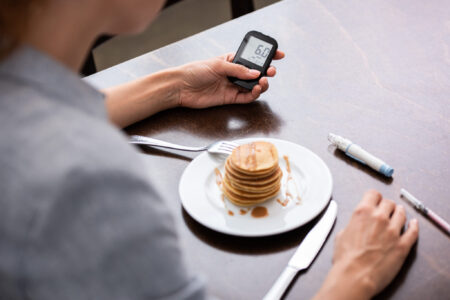 Hyperglycemia is a condition in which the blood sugar level exceeds 140 mg / dL.
Hyperglycemia is a condition in which the blood sugar level exceeds 140 mg / dL.
High blood sugar: Symptoms
Hyperglycemia is difficult to detect if you do not pay enough attention, but there are always symptoms. The best thing to do is to have a medical examination every 6 months to get an early diagnosis of any changes in your body.
The blood sugar test is usually very cheap and simple. You will have a small amount of blood taken, and that’s it. In any case, the symptoms to watch out for are:
1. Polydipsia
This is an urgent and exaggerated need to drink water. It is usually accompanied by a feeling of dryness in the mouth. It is important to drink as much water as you need because the body seeks to regulate blood sugar levels.
However, keep in mind that the problem will continue until you normalize your blood sugar. To help, add some sports activity to your day and take the medication your doctor has prescribed.
2. Skin lesions
Excessive sugar in your blood can cause skin damage, marks on your feet, redness on your face, and dry skin. Your nails, palms, and soles may also be yellow.
If you notice that you have bruises, and they seem to last much longer than usual, see your doctor as soon as you can. These symptoms cannot be ignored as they can damage blood vessels.
3. Mood swings
Hyperglycemia can cause many changes in your mood, such as irritability or depression. Some people are more rude or aggressive, but if this is not something common to you, it may be a symptom.
Remember that emotions depend on chemical processes in the brain, and these processes affect blood sugar levels.
4. Weakness and drowsiness
Because your cells are not able to effectively absorb blood sugar, energy levels are depleted. This can lead to:
- Weaknesses
- Excessive fatigue
- Drowsiness
To solve this problem, you must eat enough fresh vegetables to get high-quality vitamins and minerals. If the problem is very serious, your doctor may prescribe you some supplements.
5. Slow wound healing
Hyperglycemia causes a serious change in coagulation. This, in turn, causes a problem with the speed of wound healing. This change can also cause bruising.
If you notice that any wounds do not heal for a long time and they do not heal as quickly, as usual, you need to see a doctor. Once you regain control of your blood sugar, this will no longer be a problem.
6. Vision problems
Small veins, retinal vessels, and the optic nerve may show signs of damage from hyperglycemia. Among the problems that can cause this damage:
- Blurred vision
- Dark spots in your field of vision
- Pain around the eyes
- Difficulty concentrating on close objects in the lateral peripheral
Regular visits to an ophthalmologist can help identify these problems and lower blood sugar.
Have you noticed these symptoms in yourself? If so, feel free to see a doctor as soon as possible.
Picture Credit: VistaCreate
